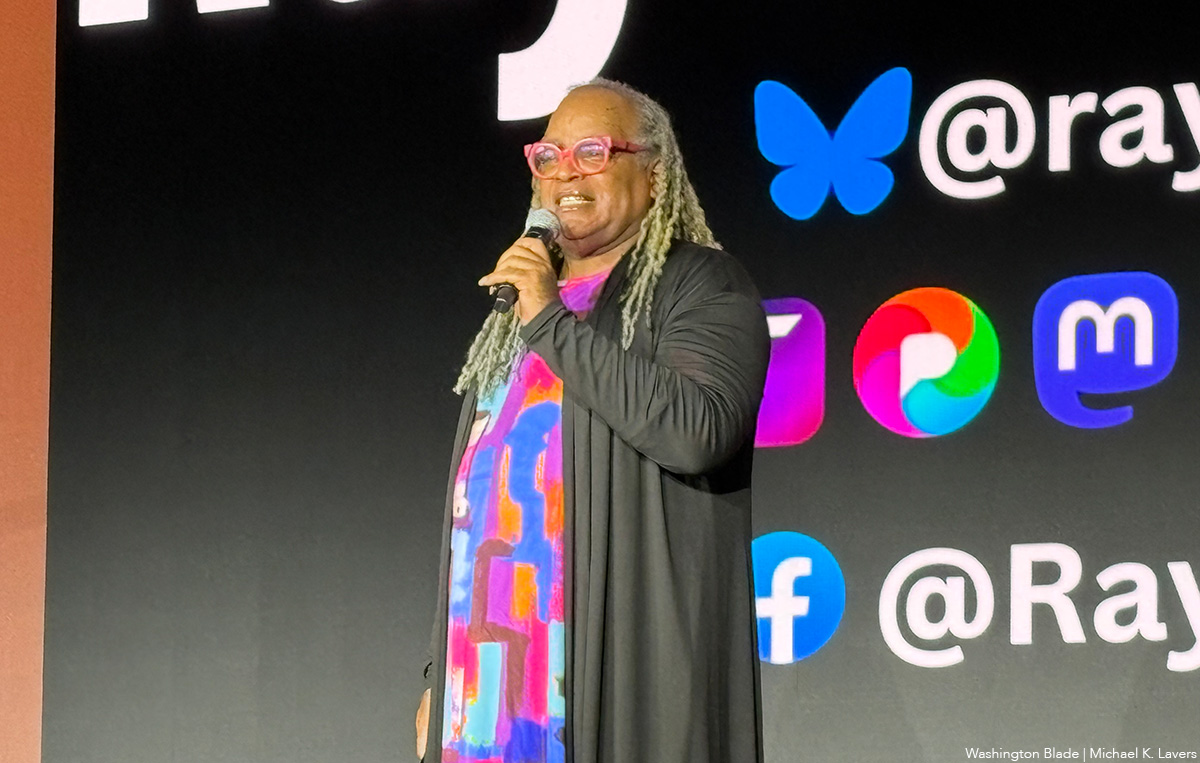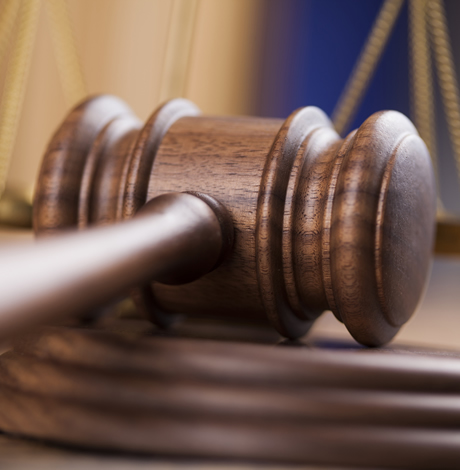Local
Man charged in Tony Hunter death back in jail
Robert Hannah arrested for alleged assault, drug possession

D.C. resident Robert Hannah, 20, who served six months in jail in connection with the Hunter case, was being held in jail this week for an arrest last month for allegedly assaulting his girlfriend.
The United States Attorney’s office asked a D.C. Superior Court judge to hold Hannah in custody on a misdemeanor assault charge, which it listed as an incident of domestic violence, following Hannah’s arrest earlier this year on a separate charge of possession of marijuana.
Hannah was scheduled to appear in court on Thursday for a status hearing. A judge was expected to decide whether he should continue to be held or be released while awaiting trial on the assault charge.
His latest arrests drew the attention of LGBT activists, who expressed outrage in July 2009 when a grand jury lowered the charge against Hannah from manslaughter to misdemeanor simple assault for his role in Hunter’s death.
Prosecutors with the U.S. Attorney’s office said they could not support a manslaughter charge, let alone a first or second-degree murder charge against Hannah, because the evidence in the case didn’t support those charges.
Police and prosecutors stated in court papers that Hannah punched Hunter in the face as the two crossed paths on the street. They said the “altercation” occurred while Hunter and a friend were walking from their car to BeBar, a gay bar on 9th Street, N.W. near the D.C. Convention Center that has since closed.
According to court records, Hannah told police at the time he was arrested in the case that he punched Hunter in self-defense after Hunter touched his crotch and buttocks in a sexually suggestive way. A witness on the scene backed up Hannah’s claim of being groped, the police report said.
However, a friend of Hunter, who said he was walking with Hunter at the time of the assault, said Hunter never touched Hannah and that Hannah and two or three other men assaulted him and Hunter in an unprovoked attack.
For nearly a year, LGBT activists criticized police and prosecutors for appearing to accept Hannah’s version of what happened. They said Hannah appeared to be invoking the so-called “gay panic” defense, in which criminals who attack gay men claim to have been sexually propositioned as an alibi.
Hannah, then 18, accepted an offer by the U.S. Attorney’s office to plead guilty to the simple assault charge. A judge later sentenced him to the maximum penalty of six months in jail for that charge.
Shortly before the sentencing, the U.S. Attorney’s office released a 14-page sentencing memorandum explaining its decision against pursuing charges of murder or manslaughter against Hannah. Among other things, the document noted that an autopsy found that Hunter was intoxicated at the time of the assault. It said the D.C. medical examiner found that a facial injury that Hunter received from being punched by Hannah was superficial and did not seriously injure him.
According to the police and medical examiner’s report, Hunter fell against a fence after being punched and stood up on his own before losing his balance and falling backwards to the ground, hitting his head on the pavement. The force of his head hitting the pavement caused a fatal brain injury that led to his death, the medical examiner concluded.
Assistant U.S. Attorney Kevin Flynn, who prosecuted the case against Hannah, told a November 2009 community meeting organized by the local group Gays and Lesbians Opposing Violence (GLOV) that the medical examiner’s report would have been used by the defense in a trial. Flynn said a jury would almost certainly have found Hannah not guilty of murder or manslaughter based on that evidence, especially the medical examiner’s assertion that Hunter’s intoxication from alcohol contributed to a loss of balance that led to his fall to the pavement.
Flynn stated in the sentencing memorandum that Hunter’s friend, who claimed the attack by Hannah was unprovoked, gave a series of conflicting statements to police that raised serious questions about his reliability as a witness had the case gone to trial.
GLOV official Christopher Farris disputes Flynn’s claim that the friend was unreliable, saying conflicting statements about a traumatic event that led to Hunter’s death shouldn’t be dismissed and could have been helpful at a trial. Farris questioned the U.S. Attorney’s office and D.C. police for failing to more aggressively pursue leads to determine whether Hannah and others who were with him targeted Hunter as a gay man.
Residents in nearby neighborhoods knew gays were arriving and leaving the area to patronize BeBar, which was well known as a gay club, Farris and other activists said.
Shaw neighborhood activist Ricky Williams, who alerted activists and the media about Hannah’s latest arrests through a series of e-mails, called on the U.S. Attorney’s office to vigorously prosecute Hannah in the current two cases.
“There is no reason why a man thrice charged with violent crimes should be able to walk the streets of my neighborhood as if nothing ever happened,” he said in one e-mail. “How many more people must suffer before anyone does anything about Mr. Hannah?”
Assistant U.S. Attorney Roger Kemp, who is prosecuting Hannah in the current two cases, called on community members to submit to the court community impact statements at the appropriate time to explain how Hannah may have had a negative impact on the community.
William Miller, a spokesperson for the U.S. Attorney’s office, said community impact statements are submitted only if and when a defendant is convicted of a crime and is about to be sentenced by a judge.
“If he is convicted, the statements would be helpful in advance of sentencing, giving the U.S. Attorney’s Office and the court additional information that could be useful,” Miller told the Blade. “Of course, all defendants are presumed innocent until, and unless, proven guilty.”
Virginia
McPike wins special election for Va. House of Delegates
Gay Alexandria City Council member becomes 8th LGBTQ member of legislature

Gay Alexandria City Council member Kirk McPike emerged as the decisive winner in a Feb. 10 special election for a seat in the Virginia House of Delegates representing Alexandria.
McPike, a Democrat, received 81.5 percent of the vote in his race against Republican Mason Butler, according to the local publication ALX Now.
He first won election to the Alexandria Council in 2021. He will be filling the House of Delegates seat being vacated by Del. Elizabeth Bennett-Parker (D-Alexandria), who won in another Feb. 10 special election for the Virginia State Senate seat being vacated by gay Sen. Adam Ebbin (D-Alexandria).
Ebbin is resigning from his Senate next week to take a position with Virginia Gov. Abigail Spanberger’s administration.
Upon taking his 5th District seat in the House of Delegate, McPike will become the eighth out LGBTQ member of the Virginia General Assembly. Among those he will be joining is Sen. Danica Roem (D-Manassas), who became the Virginia Legislature’s first transgender member when she won election to the House of Delegates in 2017 before being elected to the Senate in 2023.
“I look forward to continuing to work to address our housing crisis, the challenge of climate change, and the damaging impacts of the Trump administration on the immigrant families, LGBTQ+ Virginians, and federal employees who call Alexandria home,” McPike said in a statement after winning the Democratic nomination for the seat in a special primary held on Jan. 20.
McPike, a longtime LGBTQ rights advocate, has served for the past 13 years as chief of staff for gay U.S. Rep. Mark Takano (D-Calif.) and has remained in that position during his tenure on the Alexandria Council. He said he will resign from that position before taking office in the House of Delegates.
Local
Local LGBTQ groups, activists to commemorate Black History Month
Rayceen Pendarvis to moderate Dupont Underground panel on Sunday

LGBTQ groups in D.C. and elsewhere plan to use Black History Month as an opportunity to commemorate and celebrate Black lives and experiences.
Team Rayceen Productions has no specific events planned, but co-founder Rayceen Pendarvis will attend many functions around D.C. this month.
Pendarvis, a longtime voice in the LGBTQ community in D.C. moderated a panel at Dupont Underground on Feb. 8. The event, “Every (Body) Wants to Be a Showgirl,” will feature art from Black burlesque artists from around the country. Pendarvis on Feb. 23 will attend the showing of multimedia play at the Lincoln Theatre that commemorates the life of James Baldwin.
Equality Virginia plans to prioritize Black voices through a weekly online series, and community-based story telling. The online digital series will center Black LGBTQ voices, specifically trailblazers and activists, and contemporary Black queer and transgender people.
Narissa Rahaman, Equality Virginia’s executive director, stressed the importance of the Black queer community to the overall Pride movement, and said “Equality Virginia is proud to center those voices in our work this month and beyond.”
The Capital Pride Alliance, which hosts Pride events in D.C., has an alliance with the Center for Black Equity, which brings Black Pride to D.C. over Memorial Day weekend. The National LGBTQ Task Force has no specific Black History Month events planned, but plans to participate in online collaborations.
Cathy Renna, the Task Force’s director of communications, told the Washington Blade the organization remains committed to uplifting Black voices. “Our priority is keeping this at the forefront everyday,” she said.
The D.C. LGBTQ+ Community Center is also hosting a series of Black History Month events.
The D.C. Public Library earlier this year launched “Freedom and Resistance,” an exhibition that celebrates Black History Month and Martin Luther King Jr. It will remain on display until the middle of March at the Martin Luther King Jr. Memorial Library at 901 G St., N.W.
District of Columbia
U.S. Attorney’s Office drops hate crime charge in anti-gay assault
Case remains under investigation and ‘further charges’ could come

D.C. police announced on Feb. 9 that they had arrested two days earlier on Feb. 7 a Germantown, Md., man on a charge of simple assault with a hate crime designation after the man allegedly assaulted a gay man at 14th and Q Streets, N.W., while using “homophobic slurs.”
But D.C. Superior Court records show that prosecutors with the Office of the U.S. Attorney for D.C., which prosecutes D.C. violent crime cases, charged the arrested man only with simple assault without a hate crime designation.
In response to a request by the Washington Blade for the reason why the hate crime designation was dropped, a spokesperson for the U.S. Attorney’s office provided this response: “We continue to investigate this matter and make no mistake: should the evidence call for further charges, we will not hesitate to charge them.”
In a statement announcing the arrest in this case, D.C. police stated, “On Saturday, February 7, 2026, at approximately 7:45 p.m. the victim and suspect were in the 1500 block of 14th Street, Northwest. The suspect requested a ‘high five’ from the victim. The victim declined and continued walking,” the statement says.
“The suspect assaulted the victim and used homophobic slurs,” the police statement continues. “The suspect was apprehended by responding officers.”
It adds that 26-year-old Dean Edmundson of Germantown, Md. “was arrested and charged with Simple Assault (Hate/Bias).” The statement also adds, “A designation as a hate crime by MPD does not mean that prosecutors will prosecute it as a hate crime.”
Under D.C.’s Bias Related Crime Act of 1989, penalties for crimes motivated by prejudice against individuals based on race, religion, sexual orientation, gender identity, disability, and homelessness can be enhanced by a court upon conviction by one and a half times greater than the penalty of the underlying crime.
Prosecutors in the past both in D.C. and other states have said they sometimes decide not to include a hate crime designation in assault cases if they don’t think the evidence is sufficient to obtain a conviction by a jury. In some instances, prosecutors have said they were concerned that a skeptical jury might decide to find a defendant not guilty of the underlying assault charge if they did not believe a motive of hate was involved.
A more detailed arrest affidavit filed by D.C. police in Superior Court appears to support the charge of a hate crime designation.
“The victim stated that they refused to High-Five Defendant Edmondson, which, upon that happening, Defendant Edmondson started walking behind both the victim and witness, calling the victim, “bald, ugly, and gay,” the arrest affidavit states.
“The victim stated that upon being called that, Defendant Edmundson pushed the victim with both hands, shoving them, causing the victim to feel the force of the push,” the affidavit continues. “The victim stated that they felt offended and that they were also gay,” it says.
-

 New York4 days ago
New York4 days agoPride flag removed from Stonewall Monument as Trump targets LGBTQ landmarks
-

 Italy5 days ago
Italy5 days agoOlympics Pride House ‘really important for the community’
-

 Opinions5 days ago
Opinions5 days agoGay man details secret struggle with bulimia
-

 Florida4 days ago
Florida4 days agoDisney’s Gay Days ‘has not been canceled’ despite political challenges
















